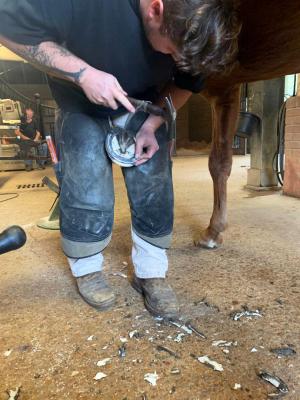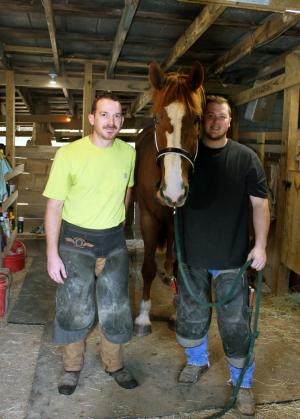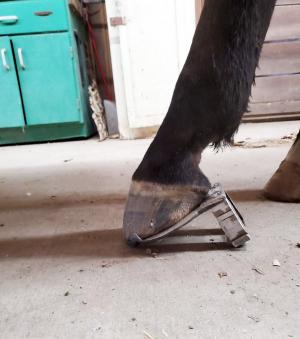By Lisa Manning, Ph.D., and Marcus Manning
Greeted by their client’s friendly dog, Farrier Kevin Duley and his apprentice, Christian Milhoan, arrive bright and early to begin their day at a small eventing barn in North Mississippi. Duley covers mostly North Mississippi and West Tennessee. When needed, Duley works closely with veterinarians when a team of experts is required. Duley has passion and expertise to offer.
Duley’s decision to become a farrier derived from the fact that his father once shod horses before his military career. The younger Duley began shoeing in 2012, and then became a Journeyman graduate of the Heartland Horseshoeing School in Lamar, Missouri. He earned his American Farrier Association Certification (AFA) immediately thereafter in October 2013.
Duley gives advice for good hoof health and care, “Every horse is different, and it is best to consult your hoof care professionals. What will work for one may not work for another. It is important to keep them on a good regular schedule. Don’t wait until it’s too late. Good communication is key. Ask questions. [Remember:] ‘No hoof, no horse.’ Do not skip on hoof care. It is essential for the health and well being of the horse.”
In Duley’s experience, there are many environmental issues that can affect a hoof, such as laminitis and weak hooves, as well as when weather conditions fluctuate from dry to wet. Founder is the most traumatic condition he sees. In Duley’s view, “Founder can be attributed to stress such as shipping, separating a mare and foal, or rich pasture grass raising the level of carbohydrates.”
According to Duley, “Laminitis is the inflammation of the sensitive laminae in the horse’s hoof, which can lead to founder. Founder is the bone detaching from the laminae and rotating or sinking.” He says, “Acute laminitis can be treatable as long as the bone does not remodel or have severe damage.” He explains, “Signs include sensitively rocking on front hooves, camping under with hind legs, and laying down for long periods.” Acute Laminitis is the first occurrence and is generally very painful. Chronic Laminitis is when the horse has had an episode on more than one occasion. In most cases, the coffin bone has remodeled or has severe damage. Generally, you will see permanent hoof distortion and other issues.
Duley cites his favorite fixes, including the heart-bar shoe, where the full bar helps to alleviate the pressure off the front half of the foot, shifting to the back of the foot. The shoe relieves pressure on the coffin bone. He explains, “Complete recovery varies from case to case and the extent of time off.” Duley proudly displays his heart-bar shoe tattoo wedding band on his left ring finger.
Duley gives examples of tough cases and success stories. He treated a horse who was non weight bearing for two months with a deep digital flexor tendon complete tear. Duley fitted a Patten Bar shoe with a 3” heel to make the horse comfortable while healing. When Duley finished the shoeing, he said, “The horse immediately walked off sound, in three seconds.”
Duley stays quite busy covering a wide region, and with his busy schedule he no longer has time for competitions. When asked earlier this year if he planned on finding an assistant apprentice, he acknowledged, “That’s a good idea!”
In August, Christian Milhoan started apprenticing for Duley and has quickly learned a great deal. Milhoan travels with Duley every day and has become his right-hand man. After two months of having an assistant, Duley admits, “This is a two-person job!” Duley explained, “A true apprentice must understand horsemanship and have respect for the animals. Most importantly, he must have a strong work ethic and stay open minded.”
Milhoan admits the biggest challenge is leg strength. “I’m using muscles I didn’t know I had,” he quipped. Duley laughed and recalled the tassels attached to his apron chaps worn at Heartland School. When the instructors saw the tassels shaking, they pulled the students off the job to give their legs a break.
Milhoan said he developed an interest in hoof care around the time his father started work with the Humane Society and with neglected horses. Milhoan decided to “make a go at it” and start school this coming January at Kentucky Horseshoeing School. He will be attending their 36-week career track course. Afterwards, he plans to become AFA certified and continue his apprenticeship with Duley.
When asked for farrier resources, Duley and Milhoan recommend Farrier Focus & American Farrier podcasts, by the International Association of Professional Farriers,along with clinics and competitions. Duley advises, “Never stop learning. The day I stop leaning it the day I stop working.”
You can find Kevin Duley’s contact information in our Bulletin Board section, page 37.
Greeted by their client’s friendly dog, Farrier Kevin Duley and his apprentice, Christian Milhoan, arrive bright and early to begin their day at a small eventing barn in North Mississippi. Duley covers mostly North Mississippi and West Tennessee. When needed, Duley works closely with veterinarians when a team of experts is required. Duley has passion and expertise to offer.
Duley’s decision to become a farrier derived from the fact that his father once shod horses before his military career. The younger Duley began shoeing in 2012, and then became a Journeyman graduate of the Heartland Horseshoeing School in Lamar, Missouri. He earned his American Farrier Association Certification (AFA) immediately thereafter in October 2013.
Duley gives advice for good hoof health and care, “Every horse is different, and it is best to consult your hoof care professionals. What will work for one may not work for another. It is important to keep them on a good regular schedule. Don’t wait until it’s too late. Good communication is key. Ask questions. [Remember:] ‘No hoof, no horse.’ Do not skip on hoof care. It is essential for the health and well being of the horse.”
In Duley’s experience, there are many environmental issues that can affect a hoof, such as laminitis and weak hooves, as well as when weather conditions fluctuate from dry to wet. Founder is the most traumatic condition he sees. In Duley’s view, “Founder can be attributed to stress such as shipping, separating a mare and foal, or rich pasture grass raising the level of carbohydrates.”
According to Duley, “Laminitis is the inflammation of the sensitive laminae in the horse’s hoof, which can lead to founder. Founder is the bone detaching from the laminae and rotating or sinking.” He says, “Acute laminitis can be treatable as long as the bone does not remodel or have severe damage.” He explains, “Signs include sensitively rocking on front hooves, camping under with hind legs, and laying down for long periods.” Acute Laminitis is the first occurrence and is generally very painful. Chronic Laminitis is when the horse has had an episode on more than one occasion. In most cases, the coffin bone has remodeled or has severe damage. Generally, you will see permanent hoof distortion and other issues.
Duley cites his favorite fixes, including the heart-bar shoe, where the full bar helps to alleviate the pressure off the front half of the foot, shifting to the back of the foot. The shoe relieves pressure on the coffin bone. He explains, “Complete recovery varies from case to case and the extent of time off.” Duley proudly displays his heart-bar shoe tattoo wedding band on his left ring finger.
Duley gives examples of tough cases and success stories. He treated a horse who was non weight bearing for two months with a deep digital flexor tendon complete tear. Duley fitted a Patten Bar shoe with a 3” heel to make the horse comfortable while healing. When Duley finished the shoeing, he said, “The horse immediately walked off sound, in three seconds.”
Duley stays quite busy covering a wide region, and with his busy schedule he no longer has time for competitions. When asked earlier this year if he planned on finding an assistant apprentice, he acknowledged, “That’s a good idea!”
In August, Christian Milhoan started apprenticing for Duley and has quickly learned a great deal. Milhoan travels with Duley every day and has become his right-hand man. After two months of having an assistant, Duley admits, “This is a two-person job!” Duley explained, “A true apprentice must understand horsemanship and have respect for the animals. Most importantly, he must have a strong work ethic and stay open minded.”
Milhoan admits the biggest challenge is leg strength. “I’m using muscles I didn’t know I had,” he quipped. Duley laughed and recalled the tassels attached to his apron chaps worn at Heartland School. When the instructors saw the tassels shaking, they pulled the students off the job to give their legs a break.
Milhoan said he developed an interest in hoof care around the time his father started work with the Humane Society and with neglected horses. Milhoan decided to “make a go at it” and start school this coming January at Kentucky Horseshoeing School. He will be attending their 36-week career track course. Afterwards, he plans to become AFA certified and continue his apprenticeship with Duley.
When asked for farrier resources, Duley and Milhoan recommend Farrier Focus & American Farrier podcasts, by the International Association of Professional Farriers,along with clinics and competitions. Duley advises, “Never stop learning. The day I stop leaning it the day I stop working.”
You can find Kevin Duley’s contact information in our Bulletin Board section, page 37.









